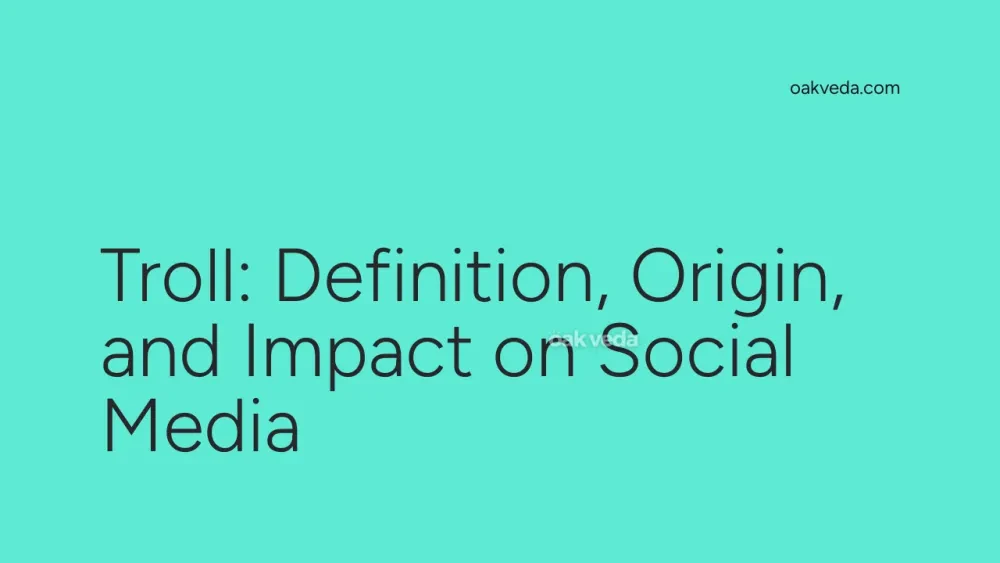
What is a Troll?
In the realm of social media and online communities, a "troll" refers to an individual who deliberately posts provocative, offensive, or off-topic content to elicit emotional responses from others. Trolling behavior is characterized by its intention to disrupt conversations, create conflict, and provoke anger or frustration among other users.
Origin and Development of Trolling
The concept of trolling predates social media, originating in the early days of online forums and newsgroups. The term "troll" in this context is believed to have emerged in the late 1980s or early 1990s. Initially, it referred to the act of posting off-topic messages to derail discussions. As the internet evolved, so did trolling behaviors, becoming more sophisticated and widespread with the rise of social media platforms.
How Trolling Works
Trolls employ various tactics to achieve their disruptive goals:
- Inflammatory comments: Posting controversial or offensive statements to provoke reactions.
- Baiting: Asking loaded questions or making statements designed to trigger emotional responses.
- Derailing: Intentionally steering conversations off-topic.
- Impersonation: Pretending to be someone else to cause confusion or conflict.
- Spamming: Repeatedly posting the same content to annoy or overwhelm other users.
Trolls often thrive on the anonymity provided by online platforms, which can embolden them to engage in behavior they might avoid in face-to-face interactions.
Types of Trolls
While trolling behaviors can vary widely, some common types include:
- Flame Trolls: Those who start heated arguments or "flame wars."
- Grief Trolls: Users who take pleasure in causing emotional distress to others.
- Shock Trolls: Individuals who post extremely offensive or graphic content to shock and disturb others.
- Concern Trolls: Those who feign concern while actually attempting to undermine or derail discussions.
- Sealioning Trolls: Users who persistently demand evidence or engage in bad-faith debate under the guise of civility.
Popular Examples of Trolling
Trolling has become a widespread phenomenon across various social media platforms:
- Twitter: The platform's real-time nature makes it particularly susceptible to trolling, with many public figures and celebrities being frequent targets.
- Reddit: Certain subreddits have gained notoriety for harboring trolls, leading to the creation of stricter moderation policies.
- YouTube Comments: The comment sections of popular videos often attract trolls seeking attention or aiming to provoke content creators.
- Facebook Groups: Trolls sometimes infiltrate groups to sow discord among members with opposing viewpoints.
Impact of Trolling on Social Media Culture
Trolling has significantly influenced online interactions and social media culture:
- Toxicity: It has contributed to a more hostile online environment, discouraging genuine engagement.
- Trust Issues: Widespread trolling has made users more skeptical of online interactions and information.
- Mental Health: Victims of trolling may experience stress, anxiety, or depression due to persistent harassment.
- Content Moderation: Platforms have been forced to invest heavily in moderation tools and policies to combat trolling.
- Self-Censorship: Some users may avoid expressing opinions for fear of attracting trolls.
Controversies Surrounding Trolling
The rise of trolling has sparked several debates and controversies:
- Free Speech vs. Moderation: Balancing freedom of expression with the need to curb harmful behavior.
- Anonymity: The role of anonymous accounts in facilitating trolling behavior.
- Legal Implications: Determining when trolling crosses the line into harassment or hate speech.
- Political Trolling: The use of trolling tactics in political discourse and campaigns.
How Brands and Influencers Deal with Trolls
Brands and influencers have developed strategies to manage trolling:
- Ignoring: Often, the best approach is to not engage with trolls at all.
- Humor: Some choose to respond with wit, deflecting the troll's negativity.
- Community Guidelines: Establishing clear rules for engagement on their platforms.
- Moderation: Employing moderators or using AI tools to filter out trolling comments.
- Blocking and Reporting: Utilizing platform features to remove persistent trolls.
Future Trends Related to Trolling
As social media continues to evolve, so will trolling behaviors and countermeasures:
- AI-Powered Detection: Advanced algorithms to identify and flag trolling behavior more accurately.
- Blockchain-Based Identity Verification: Potential solutions to reduce anonymous trolling.
- Mental Health Support: Increased focus on providing resources for victims of online harassment.
- Education: More emphasis on digital literacy to help users identify and deal with trolls.
- Legal Framework: Potential development of more robust laws addressing online harassment and trolling.
FAQs about Trolls
-
Q: How can I identify a troll? A: Look for consistently provocative or off-topic comments, a pattern of seeking conflict, and a lack of genuine engagement in discussions.
-
Q: Should I respond to a troll? A: Generally, it's best not to engage. Responding often encourages the troll and escalates the situation.
-
Q: Can trolling be illegal? A: While trolling itself isn't illegal, it can cross into illegal territory if it involves harassment, threats, or hate speech.
-
Q: How do social media platforms combat trolling? A: Platforms use a combination of user reporting systems, AI-powered content moderation, and human moderators to identify and address trolling behavior.
-
Q: Is all criticism considered trolling? A: No, constructive criticism or disagreement isn't trolling. Trolling is characterized by its intentionally disruptive or provocative nature.
Understanding the nature of trolls and trolling behavior is crucial in navigating today's social media landscape. By recognizing trolling tactics and implementing effective strategies to deal with them, users, brands, and platforms can work towards creating healthier online communities and more positive social media experiences.
You may be interested in:
- Scrubbing: Definition, Origin, and Impact on Video Content
- TikTok SEO: Definition, Origin, and Impact on Content Strategy
- Hashtag: Definition, Origin, and Impact on Social Media
- Understood the Assignment: Definition, Origin, and Impact
- Personal Brand: Definition, Origin, and Impact on Social Media
- Pitch in Social Media: Definition, Origin, and Impact

